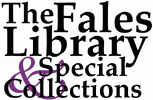Julius Hemphill Papers
Call Number
Date
Creator
Extent
Extent
Extent
Extent
Extent
Extent
Extent
Language of Materials
Abstract
Julius Hemphill was a jazz composer and saxophone player who helped found the World Saxophone Quartet. He was a founder of the World Saxophone Quartet, the Julius Hemphill Quartet, and the Julius Hemphill Sextet. Hemphill's compositions and arrangements are noted for their combination of jazz, blues, and big-band sound. This collection consists of materials created and collected by Julius Hemphill from the mid-1960s to 1995 documenting Hemphill's career as a jazz composer and saxophonist. Materials in this collection include personal correspondence, original writings, ephemera, and manuscript music in various formats and stages of completion, including composition notebooks, scores, and parts to compositions. The manuscript music consists of compositions by Hemphill in his hand, compositions prepared by professional copyists, and arrangements and re-compositions of works by Hemphill of other composers. The collection also includes audio and video recordings of Hemphill's concert recordings, rehearsals, and interviews of Hemphill from radio broadcasts.
Biographical Note
Julius Hemphill (1938-1995) was a jazz composer and saxophone player who helped found the World Saxophone Quartet. Hemphill was born in Fort Worth, Texas, and served in the United States Army for several years beginning in 1964. He began playing the clarinet, studying under John Carter, before learning saxophone. Hemphill later moved to St. Louis, Missouri and co-founded the Black Artists' Group (BAG) arts collective. He moved to New York City in the 1970s and became an active member of the city's jazz community, performing, recording, and teaching other musicians. He was a founder of the World Saxophone Quartet, the Julius Hemphill Quartet, and the Julius Hemphill Sextet. Hemphill's compositions and arrangements are noted for their combination of jazz, blues, and big-band sound.
Arrangement
Collection is arranged in alphabetical order.
Scope and Contents
This collection consists of materials created and collected by Julius Hemphill from the mid-1960s to 1995 documenting Hemphill's career as a jazz composer and saxophonist. Materials in this collection include personal correspondence, original writings, ephemera, and manuscript music in various formats and stages of completion, including composition notebooks, scores, and parts to compositions. The manuscript music consists of compositions by Hemphill in his hand, compositions prepared by professional copyists, and arrangements and re-compositions of works by Hemphill of other composers. The collection also includes audio and video recordings of Hemphill's concert recordings and rehearsals on audiocassette, reel-to-reel tapes, optical discs, VHS cassettes, and other formats. The audio recordings also include interviews of Hemphill from radio broadcasts.
Subjects
Organizations
Genres
Conditions Governing Access
Materials are open without restrictions.
Conditions Governing Use
Copyright (or related rights to publicity and privacy) for materials in this collection, created by Julius Hemphill was not transferred to New York University. Permission to use materials must be secured from the copyright holder.
Preferred Citation
Identification of item, date; Julius Hemphill Papers; MSS 542; box number; folder number; Fales Library and Special Collections, New York University.
Location of Materials
Immediate Source of Acquisition
Donated by Ursula Oppens in June and July 2018, and February 2020; the accession numbers associated with these gifts are 2018.086, 2018.112, and 2020.028. In October 2022, Marty Ehrlich donated video recordings, some of which had previously been held by Oppens and Lloyd Truffelman; the accession number associated with this gift is 2023.059.
Audiovisual Access Policies and Procedures
Audiovisual materials have not been preserved and may not be available to researchers. Materials not yet digitized will need to have access copies made before they can be used. To request an access copy, or if you are unsure if an item has been digitized, please contact fales.library@nyu.edu with the collection name, collection number, and a description of the item(s) requested. A staff member will respond to you with further information.
Born-Digital Access Policies and Procedures
Advance notice is required for the use of computer records. Original physical digital media is restricted. Born-digital materials have not been transferred and may not be available to researchers. Researchers may request access copies. To request that material be transferred, or if you are unsure if material has been transferred, please contact Fales Library and Special Collections, special.collections@nyu.edu, 212-998-2596 with the collection name, collection number, and a description of the item(s) requested. A staff member will respond to you with further information.
About this Guide
Processing Information
Prior to the collection's transfer to the archives, individual items were described by Marty Ehrlich. At the time of accessioning, an archivist rehoused the collection in archival boxes, described the materials at the collection-level, and imported a modified version of the item-level inventory. Born-digital items were identified, physically separated, and inventoried but have not yet been forensically imaged, analyzed, or described. The February 2020 accretion to this collection has been intellectually added to this collections as Series II. New York University Libraries follow professional standards and best practices when imaging, ingesting, and processing born-digital material in order to maintain the integrity and authenticity of the content.
In the spring of 2020, materials in Boxes 13, 21, and 22 with water damage and evidence of mold were cleaned by a vendor, returned to the archives, and intellectually integrated into the collection.
In November 2023, video recordings donated in 2022 were intellectually incorporated into the existing arrangement in Box 24.
In January 2026, a record carton of audiovisual material was separated by format and rehoused/redistributed into two new boxes (Boxes 25 and 26) and two shared boxes. The inventory was updated to reflect these changes. Born-digital audiovisual materials on seven physical carriers were identified, physically separated, inventoried, and forensically imaged. New York University Libraries follow professional standards and best practices when imaging, ingesting, and processing born-digital material in order to maintain the integrity and authenticity of the content.
